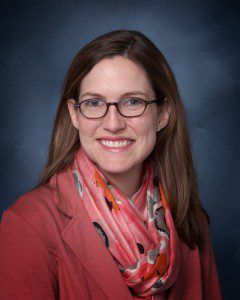 Today we are pleased to welcome Elesha Coffman to the Anxious Bench. Elesha is an Assistant Professor of History at Baylor University. Her first book, The Christian Century and the Rise of the Protestant Mainline, was published by Oxford UP in 2013 and her current book project is a spiritual biography of Margaret Mead.
Today we are pleased to welcome Elesha Coffman to the Anxious Bench. Elesha is an Assistant Professor of History at Baylor University. Her first book, The Christian Century and the Rise of the Protestant Mainline, was published by Oxford UP in 2013 and her current book project is a spiritual biography of Margaret Mead.
“These pro-lifers are headed to the Women’s March on Washington,” the Atlantic announced. “Is there a place at the Women’s March for women who are politically opposed to abortion?” the Washington Post inquired. “Can you be a ‘pro-life feminist’?” asked Vox. “I’m a pro-life Christian who proudly attended the women’s march,” one woman told Self. “Feminism’s big tent isn’t big enough for the anti-abortion movement,” countered a writer for Religion Dispatches.
Margaret Mead, the subject of my next book project, was a Christian, pro-life, and a feminist, but she is typically remembered as none of these things. Both the way she combined these identities and the reasons she gets no credit for the combination speak to our historical moment. Not only is it possible to be a pro-life feminist, she would argue, but it is unchristian—and frankly irresponsible—to be anything else.
Mead’s Christian bona fides were clear. Although her parents were atheists, they allowed young Margaret to explore religion for herself, and at age 11 she chose to join the Episcopal Church. “I enjoyed prayer,” she wrote in her autobiography, Blackberry Winter. “I enjoyed church. I worried over the small size of our congregation.” She remained committed to the church throughout her life. Her first husband was a minister. She taught Sunday school. She served on church-related committees from at least 1927, when she participated in the Women’s Committee on Race Relations (affiliated with the Federal Council of Churches), to the 1970s, when she worked on revisions to the Book of Common Prayer. Following her death in 1978, the House of Bishops approved a Resolution of Thanksgiving for her life and work, noting “her thoughtful service to the Episcopal Church” and “the model of obedience to the will of God as she perceived it and which her life represented.”
Given all of this evidence, why is Mead’s faith often forgotten or doubted? On the one hand, Mead’s academic field, anthropology, has historically had a tense relationship with religion. (See Timothy Larsen, The Slain God: Anthropologists & the Christian Faith.) People interested in Mead’s anthropological work might not know what to make of her faith, or might wish to distance her from an institution perceived as retrograde. On the other hand, in the eyes of some American Christians, Mead’s rejection of sex and gender norms placed her well outside the bounds of faith. Her breakthrough first book, Coming of Age in Samoa (1928), celebrated a society where sexual partnerships and gender roles were in flux, and she claimed that this fluidity allayed rather than created anxiety. Conservative commentators pounced when this book was “debunked” by another anthropologist after Mead’s death, consigning her “propagandistic attack against the Judeo-Christian morality of the West” to the dustbin along with the sexual revolution she had helped inspire. The debunker was later debunked himself, but the perception of Mead as a zealot hell-bent on destroying religion persisted.
If we can allow the archives and the Episcopal bishops to vouch for Mead’s Christianity, we come to the trickier matter of her pro-life convictions. On the narrow question of whether abortion should be outlawed, Mead took a stance that would not now be viewed as pro-life. She wrote in her column for Redbook magazine in February 1963, “In a country where there is a genuine and convinced divergence of ethical belief, I believe that we should not prescribe the conditions under which abortion is permissible. What is important is the provision of optimum medical protection for any woman who undergoes an abortion. Wherever abortion is illegal, unnumbered girls and women, married and unmarried, run frightful risks, and the danger of bearing damaged infants is greatly increased.”
Pragmatic support for the legality of abortion did not, however, mean that Mead supported the practice generally. She wrote in Redbook in July 1971, “It is humane to interrupt a pregnancy in certain circumstances—when a woman has suffered rape or when disease threatens the normality of the fetus or the life of the mother. But abortion, no matter how phrased, is too close to the edge of taking life to fit into a world view in which all life is regarded as valuable.”
As Daniel K. Williams’s eye-opening book Defenders of the Unborn reminds us, pro-life activism did not always focus on banning (much less criminalizing) abortion. Mead’s views easily fit into the pro-life movement of her day. More broadly, her world view definitely upheld all life as valuable. She was fascinated by mothers and babies, as this 1954 film exemplifies, even though mothering duties got short shrift from other anthropologists. Her commentaries, such as her extended dialogue with James Baldwin published as A Rap on Race, were peppered with references to cultures she had observed around the globe, with no preference for “advanced” or “primitive” societies. She found them all engrossing, all wonderful and terrible in their own ways. Mead showed love for non-human life as well. Horrified by the destructive potential of nuclear weapons and other modern technologies, she spoke at the first Earth Day in 1970. Characteristically, she titled the first chapter of her book Twentieth Century Faith: Hope and Survival, “Cherishing the Life of the World.”
It was, in fact, Mead’s fondness for mothers and babies that caused some feminists to see her as a foe rather than a sister. While noting that Mead’s life exuded liberation (Mead was a thrice-divorced professional woman, raising a daughter on her own, and probably bisexual—all fodder for those who would exclude her from Christianity), leading feminist Betty Friedan considered Mead’s emphasis on motherhood foundational to the stifling “Feminine Mystique.” “In her warning that women who seek fulfillment beyond their biological role are in danger of becoming desexed witches, she spelled out again an unnecessary choice,” Friedan complained. “She persuaded younger women to give up part of their dearly won humanity rather than lose their femininity.” In a 1974 epilogue to the original 1963 book, Friedan added another complaint—that Mead, in her introduction to the report of the President’s Commission on the Status of Women, “said, in effect, If women are all going to want to make big decisions and discoveries, who is going to stay home and bandage the children’s knee or listen to the husband’s troubles?”
The introduction to the report said nothing of the sort. It lamented a post-WWII culture in which “[e]arly marriage, more children, wives who left school and college to support their husbands’ education, a smaller proportion of women in graduate schools—all these seemed to be symptoms of a diminution of women’s earlier drive for a chance to be persons in their own right, with work and interests of their own.” It exhorted the United States to better support all women and to pay special attention to those who were disabled, poor, and/or members of minority groups. It made demands, and it would not take inaction for an answer.
If there had been some reference to a child’s scraped knee or a husband’s troubles, though, it would not have been out of character for Mead. Those things mattered to her, along with women’s career aspirations and nuclear disarmament and all the rest. People, nature, and technology were all interconnected in her mind, and she felt that it was her duty to love the whole tangled mess. She wrote in Twentieth Century Faith, “Faith and architectural principles erected our great temples and cathedrals; faith and the human sciences are needed to erect a social order in which the children of our enemies will be protected as surely as our own children, so that all will be safe.” What could be more Christian? What could be more life-affirming? And what statement could better capture the perspective of a woman who was a social scientist as well as a mother?
Had she still been living, I have no doubt that Margaret Mead would have marched in Washington on January 21. Or, rather, she would have hobbled, borne by the forked walking stick for which she was famous. She would have been dismayed at how few of her recommendations in the report of the President’s Commission on the Status of Women had been taken up, how much work was left to be done. And her banner might have read, “Cherish the Life of the World,” a hope capacious enough, perhaps, to attract even her enemies and their children.













